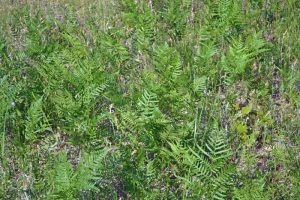
Converting timberlands to pasture releases weed seeds that often have been dormant for years. In Walton County, bracken fern emerged in a newly established bahia pasture. Credit: Mike Goodchild
With the continued expansion of beef cattle in our area, pasture and hay land is becoming scarce for new producers, and others interested in expanding their operation. Most of the counties in the Florida Panhandle have over 60% of their land in timber. Thousands of acres were put in the CRP program back in the 70’s and 80’s, further reducing acres available for grass production. With recent low timber prices, there is renewed interest in converting pine stands to pasture lands. This is a costly practice, but many landowners are taking on the challenge.
Converting timberlands to pasture involves the use of prescribed fire, clearing land with a dozer, and disking up the area to be planted to permanent pasture. These disturbances wake up a giant seed-bank of weed seeds that often have been dormant for years. Also, soil that was shaded for many years now has an abundance of sunshine, along with less ground-cover of leaves and pine needles which previously slowed or prevented weed germination.
Besides a massive influx of dog fennel, ragweed, and pokeweed. Bracken fern, crotalaria, and perilla mint are often benefactors of your new land management activities. Bracken fern is often the great beneficiary of fire. This is especially the case for land that was previously farmed before being set in pines 30-40 years ago.
Some of these plants can be extremely toxic to livestock, if not controlled. With potential drought potential in the southeast this season, a grass shortage could lead to livestock consuming these plants. So, it is essential to control weeds prior to planting. There are herbicides available to control these weeds, but multiple applications may be required, especially if dry conditions persist.
Chaparral and metsulfuron are the recommended herbicides for control of bracken fern. However, these products were developed for use in bermudagrass and will also kill or seriously injure bahigrass, so it is important to control bracken fern prior to planting. Read all labels before applying these products.
For further information on toxic plants and weed control go to the following publications:
Bracken Fern
Solutions for Life: Toxic Plants
Weed Management in Pastures and Rangeland—2017
- What are the Benefits of Freezer Beef? - August 27, 2021
- Fire Management in a Silvopasture System - March 19, 2021
- Game Cameras for Wildlife Monitoring - October 2, 2020

